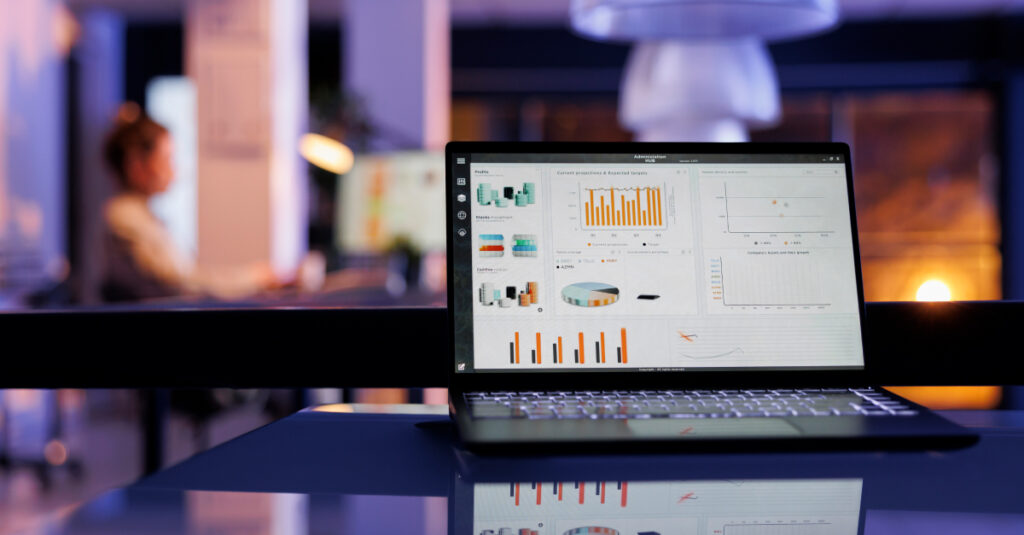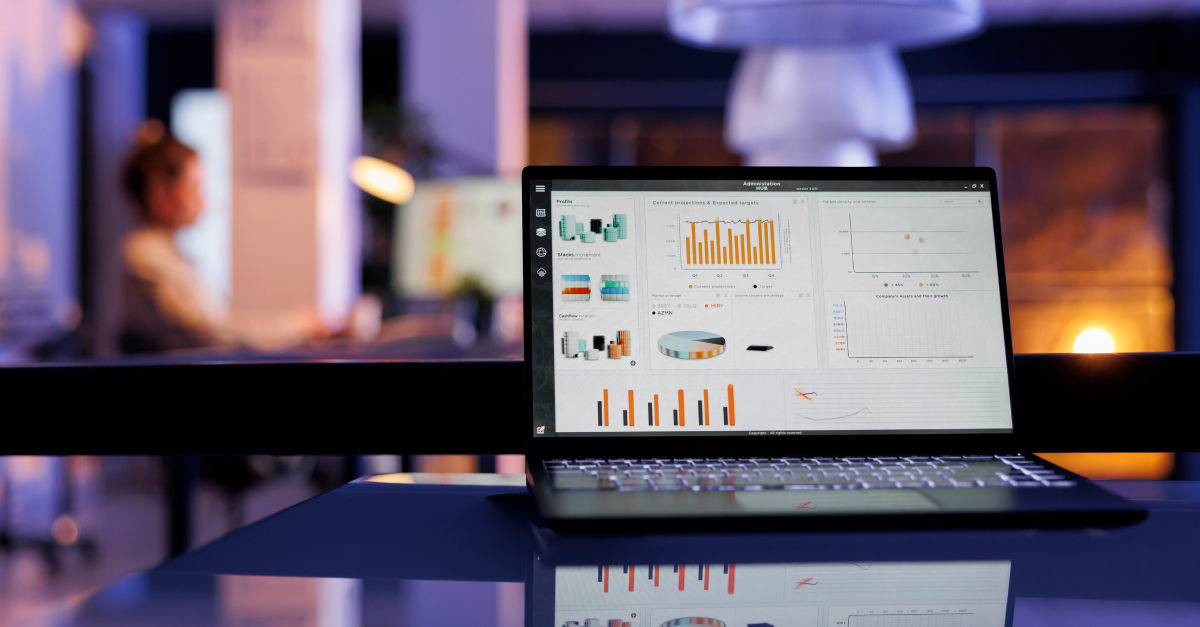
Data analytics has become an indispensable tool for decision-making in corporate travel management. Vast amounts of data exist on traveler behavior, spending patterns, policy compliance, and more. In 2023, booking. com had over 276 million rooms booked and gross bookings of $40 billion. As per Airports Council International, the global passenger volume in 2023 was 8.6 billion passengers.
With the continuously changing business travel industry, data-driven insights are revolutionizing decision-making. Travel data analytics has a valuable impact on revenue growth and gaining a competitive edge. The global data analytics market was valued at over $240 billion and is expected to reach $650 billion by 2029. Hence, around 66% of leaders emphasize the role of data analytics in driving innovation within their organizations.
Data analytics can help companies gain insights into their travel needs. On the one hand, it helps travel managers identify pain points and opportunities for improvement. On the other hand, travel data analytics delivers a better duty of care for travelers by monitoring their whereabouts and risks.
Understanding Travel Data Analytics
Travel data analytics in the business travel industry revolutionizes how companies manage travel expenses, improve traveler experiences, and optimize operational efficiency. Businesses can gain valuable insights into travel patterns and spending behaviors by leveraging large volumes of data from booking systems, travel itineraries, and expense reports.
Advanced analytics tools enable companies to monitor and control travel budgets more effectively. For instance, predictive analytics can forecast travel costs and highlight potential savings by identifying trends and opportunities for bulk booking or off-peak travel. Additionally, real-time data analytics helps track and manage travel disruptions, ensuring timely support for travelers.
Travel data analytics plays a pivotal role in several key areas of the business travel industry:
- Personalized Travel Experiences: By analyzing customer data, companies can offer personalized recommendations for travelers.
- Pricing Strategies: Dynamic pricing models that adjust prices based on demand, seasonality, and competitive landscape are driven by data analytics.
- Operational Efficiency: Airlines and hotels use analytics to optimize route planning, inventory management, and resource allocation.
- Customer Service: Predictive analytics helps anticipate and address customer service issues before they escalate.
- Demand Forecasting: Travel data analytics help predict future travel demand, allowing companies to adjust pricing, inventory, and resources accordingly.
- Risk Management: Analyzing historical data on travel patterns, weather conditions, geopolitical events, and other factors enables companies to assess and mitigate risks.
- Competitive Intelligence: Travel companies acquire an understanding of their competitive environment by examining market trends and competitors’ strategies.
- Fraud Detection: Data analytics helps identify and avoid any kind of forbidden activities such as credit card fraud, identity theft, and ticket scalping.
3 Types of Data Analytics
There are 3 main types of data analytics, each having its own benefits. They are:
1. Descriptive Analytics
Descriptive analytics is one of the simplest types of analytics and the foundation on which other types of travel data analytics are built. It is the process by which organizations and travel managers can use historical data to identify trends or patterns in how employees travel, helping them understand what happened.
Here, companies generally use software such as Excel sheets, Google charts, or any kind of data visualization tool to identify trends. This clearly helps us understand what happened. For instance, let us say you are analyzing your company’s travel data and find that there’s a seasonal increase in the flights booked from New York to San Francisco. Therefore, descriptive analytics tell you that from June to September every year, there is an increase in the number of flight bookings for this specific route.
Data visualization representations such as charts and graphs can clearly show trends like increases or decreases. Some examples of descriptive analytics are financial reports, demand reports, traffic reports, and engagement reports.
2. Diagnostic Analytics
Diagnostic analytics helps organizations understand why exactly what happened. Unlike descriptive analytics, you may have to dig deep to gather data and gain valuable insights. Diagnostic analytics takes one step further to discover the reasons behind these results. It is generally performed by finding correlations between various factors that affect business travel performance.
In the business travel industry, diagnostic analytics can be used in many ways:
Identifying cost drivers: After analyzing your travel expenses, diagnostic analysis can identify the main factors contributing to high travel costs. These could include last-minute flight bookings, preferred airlines or accommodations, specific airline routes, etc., which are more expensive. This detailed insight helps you implement cost-saving measures and negotiate better deals with travel vendors.
Analyzing policy compliance: With diagnostic analytics, companies can check their adherence to travel policies by identifying non-compliant bookings, bookings made outside of approved vendors, or bookings that exceed budget. This helps companies refine their travel policies and improve compliance.
Improving operational efficiency: Diagnostic analytics can identify inefficiencies in the corporate travel management process, such as delays in travel approvals or reimbursement processing. Companies can look into this and address these issues. This will streamline the operations and improve the overall efficiency of the business travel management process.
3. Predictive Analytics
Predictive analytics is one of the most advanced forms of travel data analytics, as it lets you predict the future. By using deep learning and machine algorithms, predictive analytics can detect patterns to predict the future and make informed decisions.
For instance, if there was a surge in flight bookings from January to March last year, it is most likely that the same may happen this year or even next year. With predictive analytics, you can also personalize business travel for employees by understanding how many were unsatisfied with their travel experience. With predictive analytics, you can ensure policy compliance and employee satisfaction.
Suggested Read:
The Complete Guide to Business Travel Analytics
Measuring Key Performance Indicators (KPI) Using Analytics
According to the latest research, 90% of business owners and company professionals leverage travel data analytics for organizational success. However, a few companies are still reluctant to use data analytics in business travel, considering the disadvantages that may come with it. However, it is essential to understand your travel costs so that you can make a smarter decision about business travel management in the future.
Your total travel cost can be calculated by using this formula:
Total travel costs = Number of trips taken * cost per trip.
Let us look into some crucial KPIs you can measure from data analytics.
1. Cost Per Trip
The cost per trip is one of the most crucial factors that needs to be measured in the business travel industry. It is the most standard metric offering a general and detailed activity-based cost analysis of corporate travel. With travel data analytics, companies can measure the cost per trip and identify various cost-saving opportunities, especially in flight and hotel bookings. This will help you optimize the total expenditures of the different kinds of trips organized in your business. It also allows you to set realistic travel budgets and assess the effectiveness of cost-saving initiatives.
2. Reduction in Travel Costs
With travel data analytics, this KPI becomes extremely useful for understanding how companies can execute new ideas and look for new travel partners. It lets companies understand how much is saved on travel expenses compared to the pre-determined travel budget or amount spent on previous trips. With these metrics, companies can make cost-conscious decisions.
3. Travel Policy Compliance
Data analytics can help companies understand which bookings are compliant or non-compliant. This, in turn, helps you understand the travel expense surge. Moreover, you can also monitor compliance with travel policy regarding travel bookings, the approval process, expense filing and reconciliation, guidelines on reimbursement, and more. This helps streamline the business travel management process in your organization.
4. Employee Satisfaction
Employee satisfaction is one of the key factors in business travel. According to GBTA, 79% of business travelers find that their travel experience impacts their job satisfaction.
If employees are unsatisfied with their travel experience, it can negatively affect the company’s ROI. By leveraging predictive analytics, companies can ensure employee satisfaction. You can look up historical data and statistical models to predict future employee satisfaction levels. You can change the company’s travel policy and ensure employee satisfaction based on these factors.
Suggested Read:
Top 6 Corporate Travel KPIs for Every Company
Maximizing Data Analytics for Informed Decision-Making
Data analytics in the travel industry can assist companies in refining their travel policies, enhance policy compliance, and cut down on unnecessary travel costs. However, in order to fully leverage the insights from these analytics, a robust tool such as a business travel management software is essential.
This is how a a travel management software like itilite can assist you:
1. Tailored Reports for In-Depth Insights
With travel management software, companies can access tailored reports, including standard and customized reports. These standard reports contain information such as flight expenses, accommodation reservations, travel approvals, carbon footprint reports, etc. You can customize these reports and get daily, weekly, or monthly email notifications. This way, you can effectively monitor your KPIs.
2. Essential Metrics for Optimizing the Travel Process
The best travel management software solutions have a dashboard that contains all the consolidated key metrics for a certain period. Companies can leverage these dashboards for in-depth insights and analysis of the travel process. With this, you can make informed decisions and make adjustments accordingly.
Travel Metrics that you can see on the Dashboard
Monthly Expenditure Overview
This provides the overall view of how much amount was spent on travel on a month-by-month basis. With this metric, you can monitor any variations in travel spending in the last few months. Additionally, it enables you to calculate the ROI to assess the effectiveness of your travel investment and ensure optimal results
Department-wise Spending
This metric provides an outline of each department’s total travel expenditures on a monthly basis. It also provides insights into individual department spending for each month. With this information, companies can investigate the underlying reasons for unnecessary expenses and implement cost-saving measures.
Reservation, Cancellations, and Adjustments
This metric provides an overview of all the flight and hotel reservations, cancellations, and monthly bookings. The high frequency of cancellations and rescheduling can lead to cost leakages due to cancellation charges and fees. Hence, managing business travel expenses effectively and efficiently is very important.
Leverage Travel Data Analytics for Better Decision-Making
With business travel expanding yearly, organizations worldwide leverage technological solutions and data analytics. Data analytics helps streamline business travel, ensure travel policy compliance, enhance travel cost savings, and more. Travel managers can use data analytics to optimize costs as it is highly beneficial in analyzing travel expenditure trends, monitoring and enforcing policy compliance, and enhancing traveler safety. Data analytics is definitely the future of the business travel industry!
To know more about the advanced features of itilite, book a free demo now!













